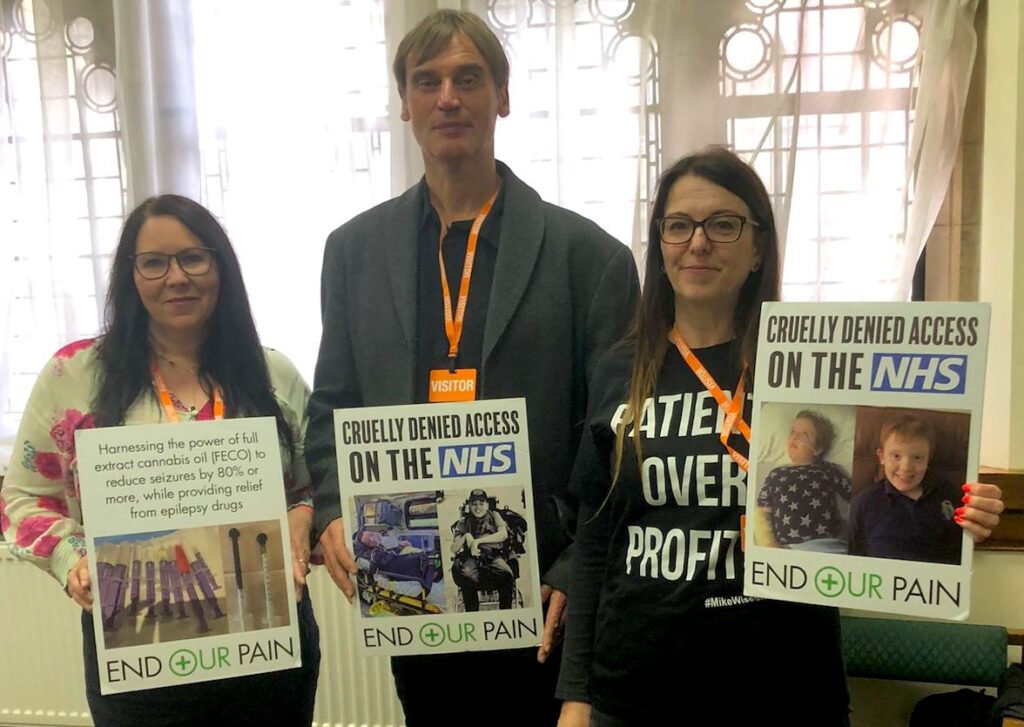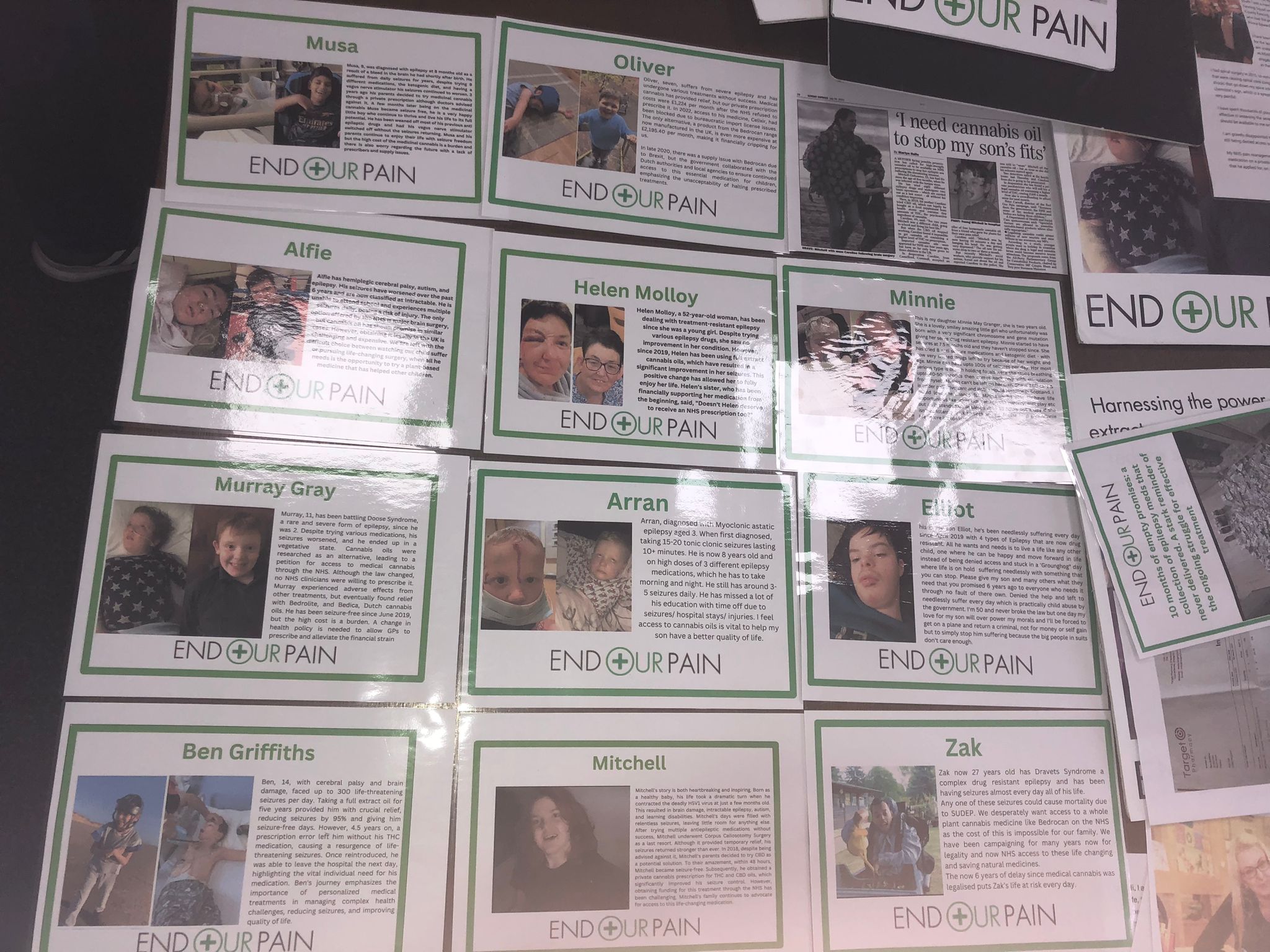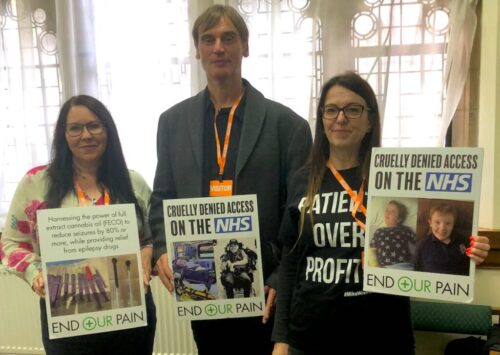Six years on from the legalisation of medical cannabis in the UK, families have made a fresh call for NHS access, as new figures reveal lack of prescribing.
Families from across the UK returned to Westminster on Tuesday 5 November, clutching photos of their loved ones, along with stories and testimonies from dozens of patients who say they are thriving thanks to cannabis-based medicines.
They were there, as they have been every year since the law changed in 2018, to call on MPs to address the barriers preventing them from accessing these treatments on the NHS.
It comes as new figures highlight the lack of prescribing of both unlicensed and licensed cannabis medicines, including Epidiolex and Sativex, in the NHS.
According to the NHS Business Service Authority, ‘fewer than five’ patients have an NHS prescription for unlicensed cannabis medicines; Cannabis Health understands that a fourth child has now been approved for a prescription on the NHS.
In a recent FOI request, the Cannabis Industry Council (CIC) asked 152 NHS Foundation Trusts in England how many individuals they had prescribed cannabis flower between 2019 and 2023— not one replied to say they had ever prescribed these treatments.
In addition, just 27% of NHS trusts replied to say that they prescribed licensed cannabis medicines, with the remainder either saying they didn’t (38%), or not responding at all (35%).
In total, 1,104 patients were prescribed licensed cannabis medicines in 2023, an increase of just 127 patients compared to 2021. Meanwhile, the number of children prescribed these medicines actually fell during this timeframe.
Compare this to the 35,000 patients currently being prescribed cannabis through the private sector, where a recent CQC report found a 118% increase in prescriptions between 2021-23 and over 300,000 items were prescribed during the same time period. There are now hundreds of different unlicensed cannabis products approved for prescription in the UK by the MHRA.
The contrast between this growing private market and the lack of movement on NHS access — despite the government’s pledge to prioritise those with chronic conditions — has left many of the families, whose stories were integral in the law change, feeling forgotten.

Families from End Our Pain attended parliament on Tuesday 5 November.
Lack of paediatric prescribers
Only 50 children in the UK are currently able to access a private cannabis prescription (costing upwards of £2,000 a month) due to a lack of paediatric neurologists willing to prescribe.
Cannabis Health first reported on this back in 2021, highlighting how only one consultant was prescribing to children with epilepsy in the UK.
At Curaleaf Clinic, where they currently prescribe from, there is now a waiting list of over 700 children. But attempts to encourage other prescribers to come forward have gone nowhere.
“We have tried to work with all of the relevant stakeholders to create a framework which is more amenable to having more paediatric neurology prescribers [but] it has been very challenging to increase the number of prescribers,” said Dr Simon Erridge, head of research at Curaleaf Clinic and an honorary research fellow at Imperial College London, speaking on a one-off podcast, Six Years of Silence, released by Medcan Family Foundation during Medical Cannabis Awareness Week.
“There is a need for doctors in all specialties to be a little bit exceptional in terms of their attitudes towards this medicine,” he added.
“But I don’t think they face the same pressures as paediatric neurologists around prescribing from their colleagues or the wider public.”
Many believe this is down to pressure from colleagues within NHS trusts and medical bodies such as the British Paediatric Neurology Association (BPNA), which has been steadfast in its refusal to recommend or support the prescribing of any cannabis-based medicines, other than Epidiolex.
Hannah Deacon, an executive director of the Medical Cannabis Clinicians Society says they are aware of doctors who do want to prescribe but are “being actively persuaded not to”.
NHS England says that many doctors and professional bodies “rightly remain concerned about the limited evidence”, while the Department of Health and Social Care insists that the NHS is taking an “evidence-based approach” to unlicensed cannabis-based treatments to “ensure they are proved safe and effective”, before they can be rolled out more widely.
Data ‘held in silos’
In 2023 Cannabis Health reported that the NHS Patient Registry, which was set up with the aim of collecting this data on safety and efficacy following a 2019 government review, was yet to enrol any patients. NHS England did not respond to a question about whether this was still the case.
Meanwhile, Dr Erridge revealed that conversations with the NHS about the potential of contributing data collected through Curaleaf’s UK Medical Cannabis Patient Registry have been held, but they “have not taken up the offer”.
“Where the barrier really lies is that this data lives in silos,” he explained.
“It would have been good for the NHS registry to have taken off, because then that data would have been held within NHS sources, alongside children who are prescribed other anti-epileptic drugs and those who haven’t yet undergone any therapy, and you would be able to compare their outcomes.”
The NHS-funded trials, also recommended in the 2019 review, have just been announced by researchers at University College London and Great Ormond Street Hospital. These will examine the safety and efficacy of isolated forms of CBD and THC in adults and children with epilepsy, but are not expected to begin recruiting patients until at least 2025.
In the meantime, epilepsy charities say there is an urgent need for new treatment options for these patients, with 35,000 children living with uncontrolled seizures in the UK, a figure that has remained unchanged for 40 years.
They are calling for more “innovative approaches” to research and a focus on personalised medicines, instead of the reliance on randomised controlled trials (RCTs), which present numerous challenges in this population.
In Parliament on Tuesday, families from the campaign group End Our Pain also called for the Health Select Committee to revisit the recommendation of observational trials to run alongside the RCTs and for “access to be opened up if they see clear benefit after three months”.

Testimonials from families of children with treatment-resistant epilepsy.
Achieving seizure freedom ‘extremely rare’
Many children who have been prescribed cannabis since 2018 are now seizure free, with a quality of life which would have been unthinkable before this. From long periods in intensive care, experiencing hundreds of seizures a day, they are able to attend school, take the bus and reach new milestones. As a result, their parents can return to work and contribute to society and the economy again.
Achieving seizure freedom in treatment-resistant epilepsy is extremely rare, explains Dr Evan Lewis, a neurologist specialising in paediatrics in Toronto, who has prescribed cannabis medicines to hundreds of epilepsy patients.
“In a population that is drug-resistant, meaning that they’ve already tried two or more drugs, to produce seizure freedom is a profound outcome,” he says.
“When you look at conventional anti-epileptic drugs, by the time you have tried three, there is a less than 3% chance of inducing seizure freedom and it continues to reduce with each new drug.
He adds: The seizure freedom rate for medical cannabis is somewhere between 4-11%, almost triple in some trials compared to conventional drugs. If you need a hard data point to tell you that cannabis has an impact on epilepsy, that’s it right there. That is a major piece of evidence.”
NHS “failing patients in need”
Chairs of the Cannabis Industry Council have called for the NHS to “take action” to expand public funding of cannabis-based medicines, accusing the service of “failing patients in desperate need”.
“When prescription cannabis was legalised six years ago, this was not the situation that patients were promised or expected,” said co-chairs, Dr Callie Seaman and Jamie Bartley.
“It’s time for the NHS to take action to expand public funding of cannabis medicines. A clear pathway should be established for patients to access prescriptions via the NHS, while private prescriptions could also be reimbursed by the public purse.”
An NHS spokesperson said: “The NHS in England already offers several cannabis-based treatments that have been approved by the MHRA and recommended by NICE as safe and clinically and cost effective.
“Many doctors and professional bodies rightly remain concerned about the limited evidence available concerning the safety and efficacy of unlicensed products. Manufacturers are encouraged to engage with the UK medicines licensed process, which can help provide doctors with the confidence to use the products, in the same way they use any other licensed medicines that are recommended for use on the NHS.”
A Department of Health and Social Care spokesperson said: “Licensed cannabis-based medicines are routinely funded by the NHS where there is clear evidence of their quality, safety, and effectiveness.
“The NHS is taking an evidence-based approach to unlicensed cannabis-based treatments to ensure they are proved safe and effective before they can be considered for roll out more widely.”
The post NHS Accused Of “Failing Patients” As Families Make Fresh Plea For Access appeared first on Cannabis Health News.
Go to Source
Author: Sarah Sinclair


